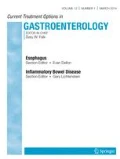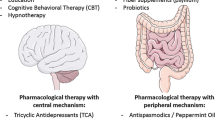Opinion statement
-
Because treatment of irritable bowel syndrome (IBS) patients can be frustrating to the clinician and patient as well, the physician should strive to gain the patient’s confidence with a concise, appropriate work-up and by offering reassurance and education that IBS is a functional disorder without significant long-term health risks.
-
First-line treatment should be aimed at treating the most bothersome symptom.
-
Tricyclic antidepressants are superior to placebo in reducing abdominal pain scores, as well as improving global symptom severity [1••].
-
Loperamide is superior to placebo in managing IBS-associated diarrhea [2••].
-
Whereas fiber has a role in treating constipation, its value for IBS or, specifically, in the relief of abdominal pain or diarrhea associated with IBS is controversial [2••].
-
Although certain antispasmodics have demonstrated superiority over placebo in managing abdominal pain, none of these agents are available in the United States [3••].
-
Probiotic therapy using Lactobacillus plantarum has demonstrated superiority to placebo in improving pain, regulating bowel habits, and decreasing flatulence [4].
-
As studied in a recent placebo-controlled prospective study, Chinese herbal medicines significantly improved bowel symptom scores and global symptom profile, and reduced IBS-related quality of life impairment [5].
-
Some of the most promising emerging therapies in IBS revolve around targeted pharmacotherapeutic modulation of serotonin receptors (ie, 5-HT3 and 5-HT4 subtypes), which are involved in sensory and motor functions of the gut. Other investigational agents that are also being explored include cholecystokinin antagonists, α2-adrenergic agonists (eg, clonidine), serotonin reuptake inhibitors (eg, citalopram), and neurokinin antagonists [6].
-
IBS is best understood through the biopsychosocial paradigm, and therefore, its effective management requires a comprehensive multidisciplinary approach based on patient education and reassurance, enhanced by diet recommendations and lifestyle modifications, and complemented by pharmacotherapy and psychosocial intervention in more severe cases.
Similar content being viewed by others
References and Recommended Reading
Jackson JL, O’Malley PG, Tomkins G, et al.: Treatment of functional gastrointestinal disorders with antidepressant medications: a meta-analysis. Am J Med 2000, 108:65–72. This article contains the most recent and comprehensive systematic review of high-quality studies evaluating the efficacy of tricyclic antidepressants (TCAs) for treatment of patients with IBS.
Jailwala J, Imperiale TF, Kroenke K: Pharmacologic treatment of the irritable bowel syndrome: a systematic review of randomized, controlled trials. Ann Intern Med 2000, 133:136–147. This article contains the most recent and comprehensive systematic review of high-quality studies evaluating the efficacy of different classes of pharmacologic agents used for treatment of patients with IBS
Poynard T, Regimbeau C, Benhamou Y: Meta-analysis of smooth muscle relaxants in the treatment of irritable bowel syndrome. Aliment Pharmacol Ther 2001, 15:355–361. This article contains the most recent and comprehensive systematic review of high-quality studies evaluating the efficacy of smooth muscle relaxants for treatment of patients with IBS.
Niedzielin K, Kordecki H, Birkenfeld B: A controlled, double-blind, randomized study on the efficacy of Lactobacillus plantarum 299V in patients with irritable bowel syndrome. Eur J Gastroenterol Hepatol 2001, 13:1143–1147.
Bensoussan A, Talley NJ, Hing M, et al.: Treatment of irritable bowel syndrome with Chinese herbal medicine: a randomized controlled trial. JAMA 1998, 280:1585–1589.
Camilleri M: Management of the irritable bowel syndrome. Gastroenterology 2001, 120:652–668.
ROME II: The Functional Gastrointestinal Disorders. Diagnosis, Pathophysiology and Treatment: A Multinational Consensus, edn 2. McLean, VA: Degnon Associates, 2000. This document contains the most up-to-date international concensus statement regarding IBS diagnosis, pathophysiology, and treatment.
Drossman DA, Whitehead WE, Camilleri M: Irritable bowel syndrome: a technical review for practice guideline development. Gastroenterology 1997, 112:2120–2137.
Drossman DA, McKee DC, Sandler RS, et al.: Psychosocial factors in the irritable bowel syndrome. A multivariate study of patients and nonpatients with irritable bowel syndrome. Gastroenterology 1988, 95:701–708.
Sandler RS: Epidemiology of irritable bowel syndrome in the United States. Gastroenterology 1990, 99:409–415.
Talley NJ, Gabriel SE, Harmsen WS, et al.: Medical costs in community subjects with irritable bowel syndrome. Gastroenterology 1995, 109:1736–1741.
Mayer EA, Naliboff BD, Chang L, Coutinho SV: Stress and the gastrointestinal tract: V. Stress and irritable bowel syndrome. Am J Physiol Gastrointest Liver Physiol 2001, 280:G519-G524.
Sternberg EM: Interactions between the immune and neuroendocrine systems. In The Biological Basis for Mind Body Interactions. Edited by Mayer EA, Saper CB. Amsterdam: Elsevier Science; 2000:35–42.
Gwee KA: The role of psychological and biological factors in postinfective gut dysfunction. Gut 1999, 44:400–406.
Whitehead WE, Crowell MD, Robinson JC, et al.: Effects of stressful life events on bowel symptoms: subjects with irritable bowel syndrome compared with subjects without bowel dysfunction. Gut 1992, 33:825–830.
Drossman DA, Creed FH, Olden KW, et al.: Psychosocial aspects of the functional gastrointestinal disorders. Gut 1999, 45(Suppl 2):II25-II30.
Naliboff BD, Derbyshire SWG, Munakata J, et al.: Cerebral activation in irritable bowel syndrome patients and control subjects during rectosigmoid stimulation. Psychosom Med 2001, 63:365–375.
Mertz H, Morgan V, Tanner G, et al.: Regional cerebral activation in irritable bowel syndrome and control subjects with painful and nonpainful rectal distension. Gastroenterology 2000, 118:842–848.
Mertz H, Tanner G, Morgan V, et al.: Functional MRI detects activation of anterior cingulate and prefrontal cortex in IBS patients, but not controls, during rectal pain [abstract]. Gastroenterology 1999, 116:A1041.
Rainville P, Hofbauer RK, Paus T, et al.: Cerebral mechanisms of hypnotic induction and suggestion. J Cogn Neurosci 1999, 11:110–125.
Talley NJ, Zinsmeister AR, Melton III LJ: Irritable bowel syndrome in a community: symptom subgroups, risk factors, and health care utilization. Am J Epidemiol 1995, 142:76–83.
Talley NJ, Weaver AL, Zinsmeister AR, Melton III LJ: Onset and disappearance of gastrointestinal symptoms and functional gastrointestinal disorders. Am J Epidemiol 1992, 136:165–177.
Owens DM, Nelson DK, Talley NJ: The irritable bowel syndrome: long term prognosis and the physician-patient interaction. Ann Intern Med 1995, 122:107–112.
Drossman DA, Chang L: Psychosocial factors in the care of patients with gastrointestinal disorders. In Textbook of Gastroenterology. Edited by Yamada T. New York; Lippincott Williams & Wilkins; 2002: in press.
Ferguson A, MacDonald DM, Brydon WG: Prevalence of lactase deficiency in British adults. Gut 1984, 25:163–167.
Goldstein R, Braverman D, Stankiewicz H: Carbohydrate malabsorption and the effect of dietary restriction on symptoms of irritable bowel syndrome and functional bowel complaints. Isr Med Assoc J 2000, 2:583–587.
Van Ness MM, Cattau EL Jr: Flatulence: pathophysiology and treatment. Am Family Physician 1985, 31:198–208.
Voderholzer WA, Schatke W, Muhldorfer BE, et al.: Clinical response to dietary fiber treatment of chronic constipation. Am J Gastroenterol 1997, 92:95–98.
Cook IJ, Irvine EJ, Campbell D, et al.: Effect of dietary fiber on symptoms and rectosigmoid motility in patients with irritable bowel syndrome. A controlled, crossover study. Gastroenterology 1990, 98:66–72.
Lucey MR, Clark ML, Lowndes J, Dawson AM: Is bran efficacious in irritable bowel syndrome? A double-blind, placebo-controlled crossover study. Gut 1987, 28:221–225.
Klein KB: Controlled treatment trials in the irritable bowel syndrome: a critique. Gastroenterology 1988, 95:232–241.
Mertz H, Fass R, Kodner A, et al.: Effect of amitryptiline on symptoms, sleep, and visceral perception in patients with functional dyspepsia. Am J Gastroenterol 1998, 93:160–165.
Su X, Gebhart GF: Effects of tricyclic antidepressants on mechanosensitive pelvic nerve afferent fibers innervating the rat colon. Pain 1998, 76:105–114.
Lancaster-Smith MJ, Prout BJ, Pinto T, et al.: Influence of drug treatment on the irritable bowel syndrome and its interaction with psychoneurotic morbidity. Acta Psychiatr Scand 1982, 66:33–41.
Greenbaum DS, Mayle JE, Vanegeren LE, et al.: Effects of desipramine on irritable bowel syndrome compared with atropine and placebo. Dig Dis Sci 1987, 32:257–266.
Jarrett M, Heitkemper M, Cain KC, et al.: Sleep disturbance influences gastrointestinal symptoms in women with irritable bowel syndrome. Dig Dis Sci 2000, 45:952–959.
Clouse RE: Antidepressants for functional gastrointestinal syndromes. Dig Dis Sci 1994, 39:2352–2363.
Poynard T, Regimbeau C, Benhamou Y: Meta-analysis of smooth muscle relaxants in the treatment of irritable bowel syndrome. Aliment Pharmacol Ther 2001, 15:355–361.
Page JG, Dirnberger GM: Treatment of the irritable bowel syndrome with Bentyl (dicyclomine hydrochloride). J Clin Gastroenterol 1981, 3:153–156.
Lembeck F, Donnerer J, Bartho L: Inhibition of neurogenic vasodilatation and plasma extravasation by substance P antagonists, somatostatin and [D-Met2,Pro5] enkephalinamide. Eur J Pharmacol 1982, 85:171–176.
Cann PA, Read NW, Holdsworth CD, Barends D: Role of loperamide and placebo in management of irritable bowel syndrome (IBS). Dig Dis Sci 1984, 29:239–247.
Hallgren T, Fasth S, Delbro DS, et al.: Loperamide improves anal sphincter function and continence after restorative proctocolectomy. Dig Dis Sci 1994, 39:2612–2618.
Fuller R: Probiotics in human medicine. Gut 1991, 32:439–442.
Houghton LA, Heyman DJ, Whorwell PJ: Symptomatology, quality of life, and economic features of irritable bowel syndrome—the effect of hypnotherapy. Aliment Pharmacol Ther 1996, 10:91–95.
Creed F, Ratcliffe J, Fernandez L, et al.: Health-related quality of life and health care costs in severe, refractory irritable bowel syndrome. Ann Intern Med 2001, 134:860–868.
Rumsey N: Group stress management programmes versus pharmacological treatment in the treatment of irritable bowel syndrome. In Towards Confident Management of Irritable Bowel Syndrome. Edited by Heaton KW, Creed FH, Goeting NLM. Duphar: Lyme Regis Printing Company; 1991:33–39.
Keefer L, Blanchard EB: The effects of relaxation response meditation on the symptoms of irritable bowel syndrome: results of a controlled treatment study. Behav Res Ther 2001, 39:801–811.
Whorwell PJ, Prior A, Colgan SM: Hypnotherapy in severe irritable bowel syndrome: further experience. Gut 1987, 28:423–425.
Whorwell PJ, Prior A, Faragher EB: Controlled trial of hypnotherapy in the treatment of severe refractory irritable-bowel syndrome. Lancet 1984, 2:1232–1234.
Whorwell PJ: Use of hypnotherapy in gastrointestinal disease. Br J Hosp Med 1991, 45:27–29.
Gershon MD. Review article: roles played by 5-hydroxytryptamine in the physiology of the bowel. Aliment Pharmacol Ther 1999, 13(Suppl 2):15–30.
Camilleri M, Northcutt AR, Kong S, et al.: Efficacy and safety of alosetron in women with irritable bowel syndrome: a randomised placebo-controlled trial. Lancet 2000, 355:1035–1040.
Prather CM, Camilleri M, Zinsmeister AR, et al.: Tegaserod accelerates orocecal transit in patients with constipation-predominant irritable bowel syndrome. Gastroenterology 2000, 118:463–468.
Mueller-Lissner SA, Fumagalli I, Bardhan KD, et al.: Tegaserod, a 5-HT4 receptor partial agonist, relieves key symptoms of irritable bowel syndrome (IBS) [abstract]. Gastroenterology 2000, 118:A175. 2000.
Bouras EP, Camilleri M, Burton DD, McKinzie S: Selective stimulation of colonic transit by the benzofuran 5-HT4 agonist, prucalopride, in healthy humans. Gut 1999, 44:682–686.
Author information
Authors and Affiliations
Rights and permissions
About this article
Cite this article
Sach, J.A., Chang, L. Irritable bowel syndrome. Curr Treat Options Gastro 5, 267–278 (2002). https://doi.org/10.1007/s11938-002-0049-3
Issue Date:
DOI: https://doi.org/10.1007/s11938-002-0049-3




